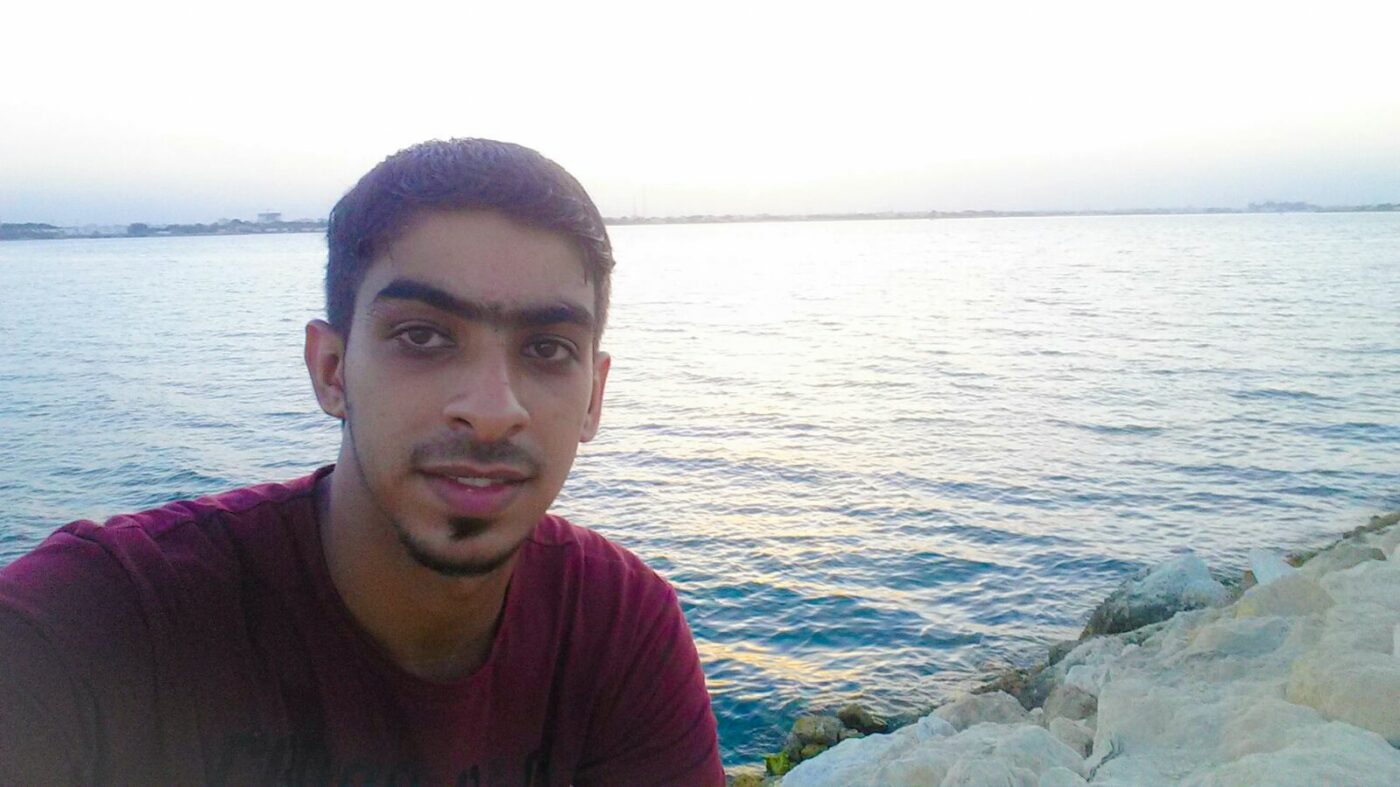Ahmed Ali Yusuf was a 19-year-old university student when he was arrested without a warrant. Since his arrest, Ahmed has been subjected to both physical and psychological torture. He is currently held at Jau Prison where he is being subjected to severe medical negligence, degrading treatment and torture, especially amidst the COVID-19 pandemic.
On 9 February 2017, Ahmed was warrantlessly arrested at sea during the Ministry of Interior operation to arrest two fugitive political prisoners, one of whom was Reda AlGhasra, which resulted in the killing of three individuals and the wounding of others. As a result, Ahmed’s foot was wounded by live bullets, an injury he still suffers from. Prior to the arrest, Ahmed’s family home was repeatedly subjected to raids and searches. In these raids, some personal belongings were confiscated. Ahmed’s family was aware that their son was being pursued; however, they did not understand the reasons behind the raids as the Bahraini forces failed to present them with any papers or provide them with any reasons. After the arrest, the Ministry of Interior published the reasons behind the arrest, maintaining that Ahmed was accused of smuggling convicts and transporting weapons and explosives.
After his arrest, Ahmed was forcibly disappeared for 40 days in Building 15 at Jau Prison. After 40 days, Ahmed called his family complaining about the torture he had been subjected to in order to make confessions. Ahmed suffered different kinds of torture, including harassment, beatings in sensitive and genital areas, electrocution, being chained by his legs, hands, and neck, being placed in a small room with cold air conditioning, and psychological torture. Under this torture, and with the forced absence of his lawyer throughout the interrogation, Ahmed confessed to the charges attributed to him.
During his detention, Ahmed was transferred to Al-Qala’a hospital where he was placed on an IV drip due to the severity of the torture he was subjected to. He was later transferred back to Jau prison. Approximately two months later, he was transferred to the Dry Dock Detention Center. At Dry Dock Detention Center, where Ahmed was held in solitary confinement for almost a year, the torture continued as Ahmed was taken away from the surveillance cameras by a policeman of an Arab nationality to be beaten and insulted. The officer forced him to kiss his feet and shoes, and when Ahmed refused, he beat him even more. Ahmed’s family noticed he showed signs of torture when they were allowed to see him for the first time at Dry Dock Detention Center approximately two months after the arrest. During Ahmed’s family visits, an officer would be present to write down the matters they discussed with their son.
Ahmed was one of the 59 defendants convicted in the unfair mass trial in which Ahmed AlMalali and Ali AlArab were both sentenced to death. Ahmed was charged with 1) smuggling; 2) concealment and harboring; 3) having a bomb factory in his house; 4) possession of weapons and explosives with the intention to use them for a terrorist attack; 5) training on the use of weapons in Iran; 6) joining a terrorist cell; and 7) financing a terrorist cell. Ahmed was sentenced to life imprisonment, and the judgment was upheld by both the Court of Appeal and the Court of Cassation. During the trial, Ahmed was denied access to his attorney and denied adequate time and facilities to prepare for trial. Furthermore, the confessions Ahmed made under torture during the interrogation were used against him in court.
On 23 May 2021, Ahmed contracted the Coronavirus after its outbreak at Jau Prison. Ahmed’s family learned about it through the website of the Ministry of Health, and Ahmed only called his family once during the quarantine to inform them he was infected with the virus. He complained of his health and the deteriorating situation with the spread of the virus in the building. Ahmed did not call again, but the same website later showed that he had recovered. During his one call, Ahmed also informed his family that he might be transferred to quarantine with one of the prisoners, but did not call back to confirm. No proper healthcare and medication were offered at the prison during the outbreak of the virus. Ahmed was not allowed to leave his cell and had to share one with many prisoners. Moreover, no hygienic products were available for Ahmed. He had only received the first dose of the Russian vaccine before he contracted the virus.
The actions committed by the Bahraini authorities against Ahmed and other political prisoners amidst the COVID-19 pandemic all constitute violations of the United Nations Rules for the Treatment of Prisoners (Nelson Mandela Rules). Further, the torture and persecution Ahmed was subjected to during his interrogation and trial violate the Bahraini Constitution and other International Law treaties to which Bahrain is a signatory, including the Convention against Torture and Other Cruel, Inhuman or Degrading Treatment of Punishment (CAT) and the International Covenant on Civil and Political Rights (ICCPR). Thus, ADHRB calls on the Government of Bahrain to make proper medical treatment available to all prisoners during the pandemic, to drop all the unfounded charges against Ahmed and hold a fair retrial if charges can be substantiated against him, to investigate the allegations of torture Ahmed was subjected to, and to immediately release him and all political prisoners.





